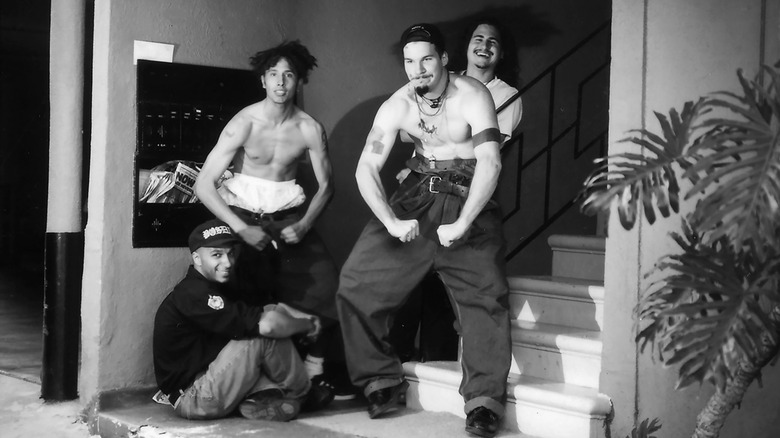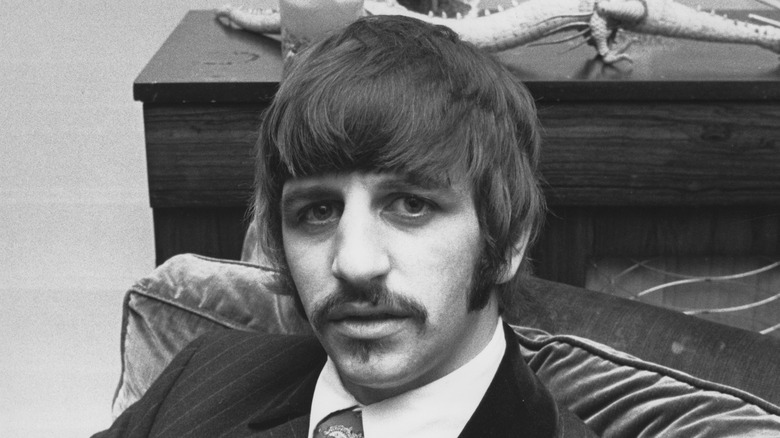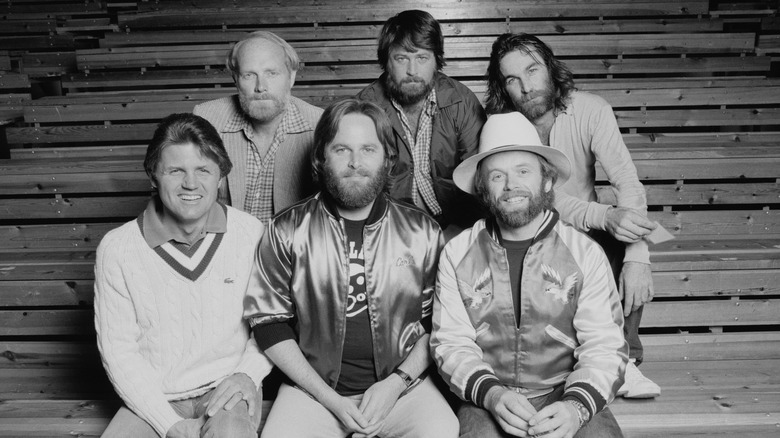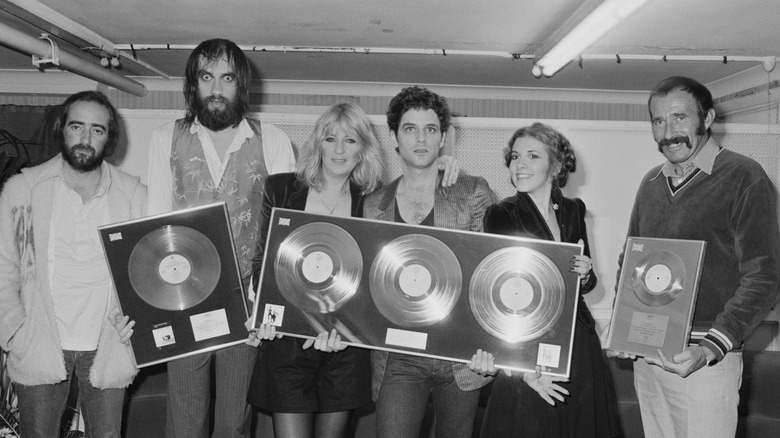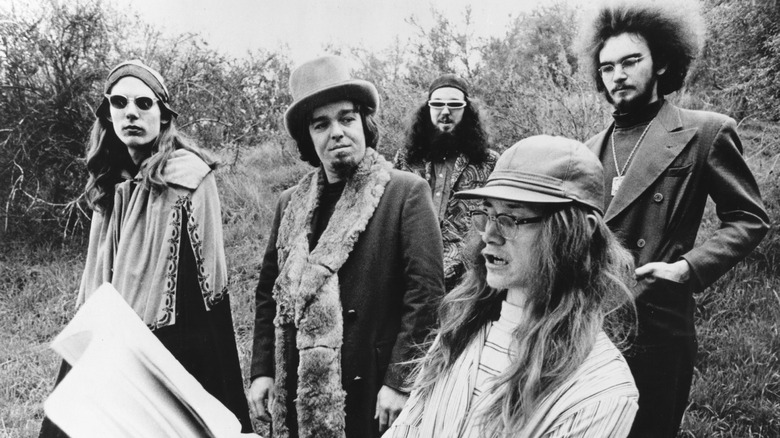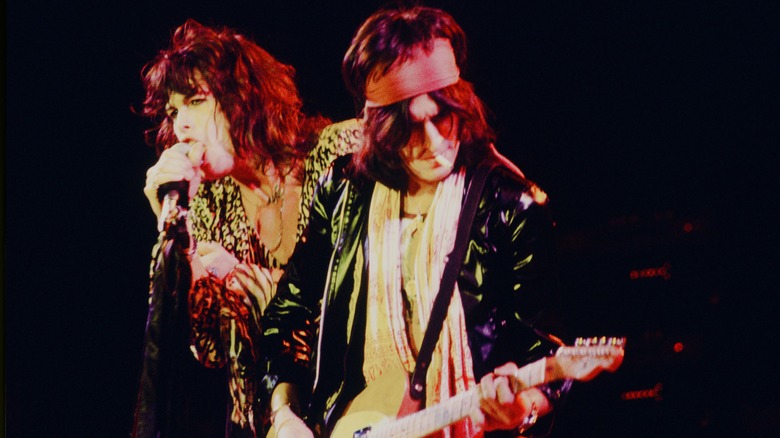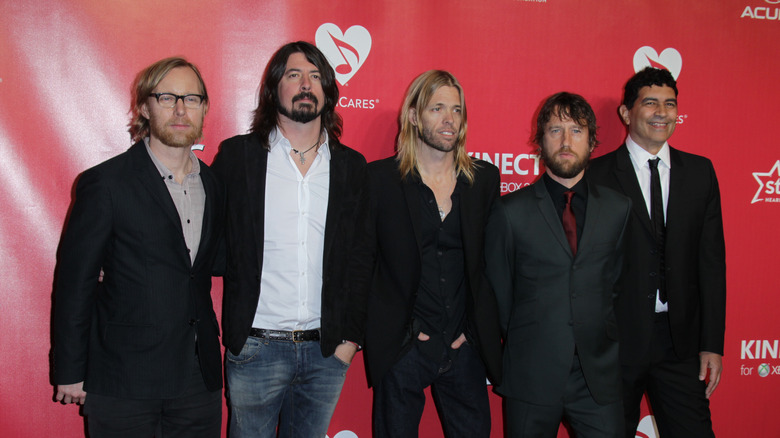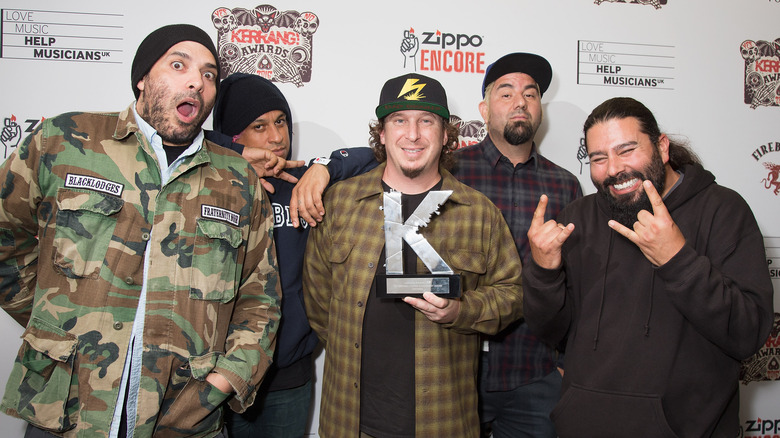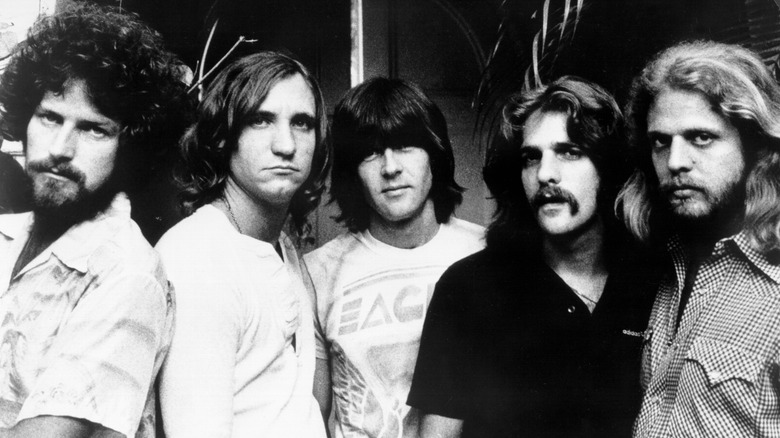Albums That Nearly Ended Rock Bands
Most people of a certain age, have, at one time in our lives, dreamed of becoming a rock star. The fame, the adulation, the creativity, travel, bucketloads of cash — what's not to love? But as reported by The Wall Street Journal, the life of your typical rock star is a hard one, with rockers having a life expectancy some 20 years shorter than that of the general, non-rocking population.
And not only this, but the work itself is hard. The music industry draws creatives to it like moths to a lightbulb, but music is a cutthroat business. When, for example, financial pressure dictates that, for the sake of the profit, an exhausted band must hit the road on tour once again, or that the band's next album needs to be written ASAP — and it has to be a hit for the band to survive — the strain on the individuals involved can be huge.
The rock album has long been the standard by which bands are judged. Whatever the quality of their live shows or the drama going on backstage, a classic album can mean immortality for a group, binding them to a particular time and place in the minds of their fans. But despite the best intentions of musicians, producers, and managers things don't always go according to plan, and often come to threaten the existence of the bands themselves. Here are some notable albums that nearly blew up in their creators' faces.
Rage Against the Machine's difficult second album
Politically active rap metal outfit Rage Against the Machine had made quite a splash with their self-titled debut LP in 1992. Fueled by heavy airplay for the album's now-iconic lead single "Killing In The Name" — an anti-systemic racism protest song which, per Louder, was written in response to the killing of Rodney King — RATM found themselves at the top of the Billboard album charts and making waves in all the right places.
After three years of non-stop touring, the group was anxious for a successful follow-up, but per Ultimate Classic Rock, the quartet led by vocalist Zack de la Rocha found themselves reacting badly to the pressure. Creative differences abounded, and recording sessions in a luxury Atlanta studio — costing $2,000 a day, per the same source — quickly descended into infighting, with the band briefly splitting, and its members returning to Los Angeles to regroup.
However, when the album finally dropped, it was clear that the band was happy with the results. Guitarist Tom Morello explained to the press (via Loudwire) that, despite the delays and creative differences, "Evil Empire" felt like a continuation of the collaborative spark that underpinned their debut. "I'd say that this record ... is a real testament to the band's chemistry," Morello said. "It's just the way the four of us play together that makes it pretty seamless, and that's where we're lucky." Like the band's debut, "Evil Empire" peaked at number one on the Billboard Hot 100 following its release in April 1996, and later went triple platinum per the RIAA.
The first Beatle quit earlier than you think
Any music fan can tell you how fractious was the break up of the typically love-preaching Beatles, the "four lads who shook the world" splitting amid accusations of betrayal, of broken friendships and everyone thinking about "My, Me, Mine," as George Harrison later put it. But who was the first Beatle to walk? Was it John Lennon, who, as noted in the Independent, announced his intention to leave the band way back in 1969, some eight months before Paul McCartney's press conference made the break-up of The Beatles public? Or was it McCartney himself?
The answer, surprisingly, is neither. In fact, it was Ringo Starr who first quit The Beatles — albeit temporarily, for two weeks — back in 1968, while the band was recording material for "The Beatles," more commonly known as "The White Album." "I left because I felt two things: I felt I wasn't playing great, and I also felt that the other three were really happy and I was an outsider," Starr claimed, per Beatles Bible. But as Starr later found out, the rest of the Fab Four were feeling equally estranged, each feeling like they were the one being left out.
After a holiday in Sardinia on the yacht of Hollywood friend Peter Sellers, Ringo returned to his bandmates in the studio, where, per Forbes, he found that his drum kit had been decorated with flowers and a "Welcome back, Ringo" sign by Harrison.
The Beach Boys hit a roadblock
Alongside The Beatles, Californian rockers The Beach Boys are considered the ultimate source of feel-good '60s tunes. But just like their British rivals, towards the end of the decade the band founded by Mike Love, Al Jardine, and brothers Brian, Carl, and Dennis Wilson found themselves embroiled in a crisis that threatened to bring their rich creative streak to a grinding halt.
In 1967, the pressure on the band was huge. The Beatles — who, despite their rivalry, were good friends with the members of The Beach Boys — had just rocked the world with the release of the seminal "Sgt. Pepper's Lonely Hearts' Club Band." Brian Wilson, the Beach Boys' principal songwriter, wanted to top it. Their recent single, "Good Vibrations," had been an enormous hit, and, per Goldmine, the group began work on a new album, "Smile," which was planned to be a whole LPs worth of music of the same standard.
But according to Groovy History, Brian Wilson, was, perhaps due to his copious drug use, beginning to experience extreme paranoia — specifically, that he was being followed by investigators recruited by his own father and '60s super-producer Phil Spector — and his mental health declined to the point at which his behavior was affecting his collaborators. Not only that, but his musical ambition was testing for his bandmates, who were exhausted from touring Wilson's music. Per Ultimate Classic Rock, the band "pulled the plug" on Wilson's endless sessions, and shelved the project. It was finally released as "Smile Sessions" in 2011.
Fleetwood Mac and the drama of Rumours
Fleetwood Mac is a band that has seen many changes in both style and personnel, but, to most fans, there is no more definitive line-up than that which created what many critics consider to be the band's masterpiece, "Rumours," released in 1977. And almost as equal in fame to the album itself is the inter-band conflicts during its making, which — just perhaps — underpin much of its enduring brilliance.
According to Rolling Stone, the band members were going through two heated break-ups at the time of recording: Stevie Nicks had acrimoniously split from Lindsey Buckingham, with whom she had first joined the band in 1975, while her fellow vocalist Christine McVie was in the midst of a divorce with another bandmate, the bassist John McVie. According to Biography, though this latter ex-couple kept things cool by maintaining a respectful — if awkward — silence when not directly working together, Nicks and Buckingham let the fallout from their break-up hang out for all to see, with fiery arguments creating a sour atmosphere between them and the other band members. Per Rolling Stone, Nicks even went as far as to have an affair with drummer and founding member Mick Fleetwood, risking causing an irrevocable rift in the band.
But while the romantic turmoil involving all five members of the group may have made the "Rumours" sessions a personal trial, it also gave the musicians some of their greatest inspiration, with Nicks and Buckingham writing "Dreams" and "Go Your Own Way," respectively, songs which remain fan favorites.
Captain Beefheart terrorized his band while making of Trout Mask Replica
Don Van Vliet — more commonly known to fans of weird music as "Captain Beefheart" — was one of the twentieth century's great eccentrics. An outsider artist who also worked in the visual arts, Beefheart carved a niche for himself in the American avant-garde leading The Magic Band, with whom he originally performed heavy blues in the style of Howlin' Wolf before pushing on to more obscure and oblique music. Their seminal 1969 album, "Trout Mask Replica," is still today famous — or perhaps notorious — for being one of the most difficult and uncompromising albums in rock history.
The circumstances of its composition are just as shocking as the music. In an extract of a recent book by Magic Band member John "Drumbo" French published in The Quietus, the musician describes how he had to transcribe Beefheart's wild improvised compositions — he wrote the songs on piano, an instrument he didn't know how to play — and then had to teach the band over the course of 12 months how to play the erratic, unconventional music to Beefheart's specifications. Per The Michigan Times, the band were subjected to marathon 12 hour rehearsal sessions, were starved, isolated, and subject to emotional and physical abuse from Beefheart himself — French left the band after being thrown down a flight of stairs, just as production on the record was coming to a close. Somehow, the hard-done-by musician returned, and the band continued in a similar form for another three albums.
King of Leon's breakthrough nearly finished them
When Kings of Leon released the international smash single "Sex on Fire" it completed their transformation from garage rock indie darlings into full-blown stadium-filling megastars. As well as the single itself charting in numerous countries around the world, the album from which the song was taken, 2008's "Only By The Night," finally confirmed the band's breakthrough in their native US, going double platinum and winning two Grammy awards, per the album's producer Jacquire King.
However, the band led by vocalist Caleb Followill found success difficult to handle. Per NME, the band specifically found their changing audience, made up of new listeners who did not appreciate their earlier heavy work, more difficult to connect with, while constant touring — and some disastrous shows which led to the band taking to Twitter to vent their frustration — exhausted the band. By 2011 an onstage walkout by Caleb had the press asking if the Kings had a future. As bassist and keyboardist Jared Followill explained to the Metro: There was definitely an internal struggle – you couldn't even say "radio airplay" without Caleb getting angry. We'd been called sell-outs after 'Sex on Fire.' He didn't want people to think that was all we'd tried to do."
With their 2010 follow-up album failing to realign their creative interests, the band went on hiatus shortly after. However, they returned in 2013 with "Mechanical Bull," which many critics saw as a return to form.
The Fall's lowest ebb
Hailed as major influences by scores of US acts, such as Sonic Youth, Pavement, and LCD Soundsystem, the legend of UK post-punk pioneers The Fall extends far beyond the music itself, being notable for the high turnover of band members and the prolific recording and touring schedule following their formation in 1976. And by the late '90s, founder and only constant member Mark E. Smith was as well known for his extreme behavior in real life as he was for his singular and brilliant music.
Longtime Fall bassist Steve Hanley described much of the animosity that Smith aroused in "The Big Midweek," a memoir of his 18-year stint in the band from 1979 to their fiery implosion in 1998. Amid Smith's growing manipulative behavior, alcoholism, and dedication to hard drug use — a constant theme in The Fall's music — The Fall split following a widely reported on-stage punch-up, with Smith finding himself in jail.
Much of Smith's mania is plain to see on the album they released at the time — the group's 19th, per Spectrum Culture — 1997's "Levitate," a Smith-produced and unfocused record that many fans saw as The Fall's first misstep, and, as the final album to feature Hanley, the end of an era. Smith, however, would retain keyboardist Julia Nagle and regroup, as always, to deliver another record the following year, and The Fall continued to tour and record until his death in 2018.
Aerosmith's Night In The Ruts
Steven Tyler and Joe Perry's Aerosmith is now so much associated with their enormous success in the '90s — when, off the back of hits like "Crazy" and "I Don't Want to Miss a Thing," they received constant radio play — we may not recall that the band first rose to prominence some two decades earlier. Their top 10 hit "Walk This Way" — later rereleased with Run-DMC — originally came out all the way back in 1975, according to Songfacts.
But Aerosmith's unstoppable rise came to an end in 1979, when guitarist and founding member Perry left amid internal strife. Per Ultimate Classic Rock, the band were hemorrhaging money, and, already exhausted from a hectic touring schedule, were sent out on the road again in the middle of what were meant to be the recording sessions for their sixth album — it was too much for the guitarist, whose absence meant that the eventual guitar parts for what would eventually be released as "Night In The Ruts" were recorded by a number of session musicians.
The album was not considered a success, and the band's popularity dwindled. However, Aerosmith persevered, thankfully, to enjoy a resurgence starting in the late '80s.
Foo Fighters scrapped the original version of One By One
After rising from the ashes following the tragic death of his former bandmate Kurt Cobain and the end of the seminal grunge band Nirvana, Dave Grohl started his own band, Foo Fighters, and from the band's 1995 self-titled debut to 1999's "There Is Nothing Left to Lose," Grohl established himself as a superstar in his own right, and lay groundwork for a long and fruitful second act.
However, at the turn of the millennium, the wheels on the Foo Fighters juggernaut looked just about set to fall off. As noted by Spin, the first sign of trouble was when drummer Taylor Hawkins fell into a coma following a heroin overdose while on tour in the UK. Per Rock N' Roll True Stories, the tour was canceled, and the band instead went to work on their next album at Hawkins' home studio while he recovered. But the sessions went badly, and after four months Grohl was disappointed by the recordings. After shelling out $1 million on recording and production, they abandoned the project, and took an extended break, with Grohl joining Queens of the Stone Age temporarily. It was an uneasy time, but the hiatus worked, and the band re-emerged in 2002 with the re-recorded "One by One," continuing their string of hit albums.
If you or anyone you know is struggling with addiction issues, help is available. Visit the Substance Abuse and Mental Health Services Administration website or contact SAMHSA's National Helpline at 1-800-662-HELP (4357).
Deftones nearly split while getting sober
When Deftones' frontman Chino Moreno tells Louder that the alternative metal band's "dark days" began with their 2000 critically-acclaimed album "White Pony," you can't help but interpret the album's title a certain way. As Moreno candidly explains, the Californian alternative metal group's success coincided with their growing use of cocaine. And while the hard-partying lifestyle might be fun for a while, Deftones found that it was beginning to affect both their work and their friendships within the band. "We got to a point where we were like a shell of ourselves, of what we used to be as a band. And that depresses you and that gets you even deeper into the hole."
Somehow, though, the band managed to get out of it, though it took many years of strife to do so. By the mid-2000s, the band were trying to get sober, and tensions rose between them to the point that, per Reuters, they were close to breaking up. However, the tension also served a creative purpose, instilling their fifth album, 2006's "Saturday Night Wrist," with a rawness they were thought to have lost, making it a critical and commercial triumph, and a comeback for a band who, for a while, looked like they were on the verge of collapsing.
If you or anyone you know is struggling with addiction issues, help is available. Visit the Substance Abuse and Mental Health Services Administration website or contact SAMHSA's National Helpline at 1-800-662-HELP (4357).
The Eagles couldn't match their biggest hit
Just imagine trying to follow a hit as gigantically huge as The Eagles' "Hotel California." Is it even possible? The 1977 rock masterpiece from the album of the same name instantly became the band's signature song and biggest international hit, bagging them a Grammy award for best rock song. The song became a classic, while its extended guitar solo was said to be the greatest of all time by Guitarist magazine in 1994.
The band, who were already huge prior to the release of the new material as evidenced by the enormous popularity of their first "Greatest Hits" album in 1975, toured the new album incessantly, according to Ultimate Classic Rock, and musicians found themselves growing frustrated with one another and growing apart. When it came to finally recording a follow up, founding member Glenn Frey told the Independent. "We no longer trusted each other's instincts, so there was considerable disagreement. Plus, both [Don] Henley and I had developed drug habits, which didn't help matters. Going to the studio was like going to school – I simply didn't want to go." The resulting album, "The Long Run" (1977), was a critical and commercial failure, and would be the last album they released for 28 years.

